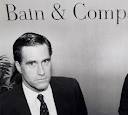 |
| CEO Hans-Paul Buerkner of BCG.
|
Where Romney got his start
They're the Bain Capital of public education. Politically connected
Boston Consulting Group consultants are paid million of dollars, much of it from public funds that might ordinarily be used to fund public education. Instead they are financing the dismantling of public education, mainly in urban school systems, responsible for the education of primarily poor kids and children of color. BCG can take credit for the ongoing replacement of these public institutions with networks of private education management companies operating charter schools, distance learning companies, and tutoring programs.
With 4,800 consultants in 74 offices in 42 countries, the firm ranks as one of America's Largest Private Companies, according to Forbes magazine. BCG's consultants include notables such as Mitt Romney, Indra Nooyi, CEO of Pepsi; Jeff Immelt, CEO of General Electric; Sally Blount, dean of the Kellogg School of Management; and Israeli Prime Minister Benjamin Netanyahu. Romney and Netanyahu
became close associates while both were consulting for the group and Romney was recruited to Bain Capital directly out of BCG.
 |
| Romney & Netanyahu at BCG |
Former Ed Secretary and architect of NCLB, Margaret Spellings who currently operates something called the Campaign for Free Enterprise, is a senior BCG advisor. Kermit King, who played a major role in
bankrolling anti-gay legislation in California is one of BCG's leading consultants.
The group was also brought into Chicago by Arne Duncan and the Gates Foundation in 2008 to design the failed high school reform and school privatization component of Mayor Daley's Renaissance 2010. Duncan
continues to involve BCG in his Race To The Top initiative.
In Philadelphia, BCG has been deeply involved in nearly every hot-button issue faced by the District, including continued expansion of charter schools. After decades of this corporate-style reform however, there is no evidence that BCG's work has produced any better outcomes for students or for the communities in which they live.
According to
a report in Huffington,
BCG has identified up to 60 Philadelphia school buildings as potential candidates for closure and helped line up private vendors willing to replace the School District's unionized blue-collar workforce at a $50 million discount. The broad scope of BCG's efforts this spring are detailed in previously
unreleased "statements of work" obtained by the Notebook/NewsWorks under
Pennsylvania's Right to Know law.
But in Philly, where BCG is credited with identifying some $122 million in "achievable savings," the result has been an even larger and rapidly growing budget deficit, now estimated at around
$282 million.
Documents obtained Friday by the
Notebook/NewsWorks outline the
complex relationship connecting BCG with the William Penn Foundation and United Way of Southeastern Pennsylvania.
William Penn has directly contributed $1.5 million and helped raise
$1.2 million more to fund BCG's work, and United Way has served as a
fiscal conduit for those funds.
In separate interviews Friday, top leaders from William Penn and
United Way lauded BCG's work and dismissed as "conspiracy theory" the
claims by some critics
that the firm and the private philanthropists supporting its work are
part of a coordinated effort to privatize the city's public education
system.
I'm
one of those critics who believes there really is such a conspiracy.








